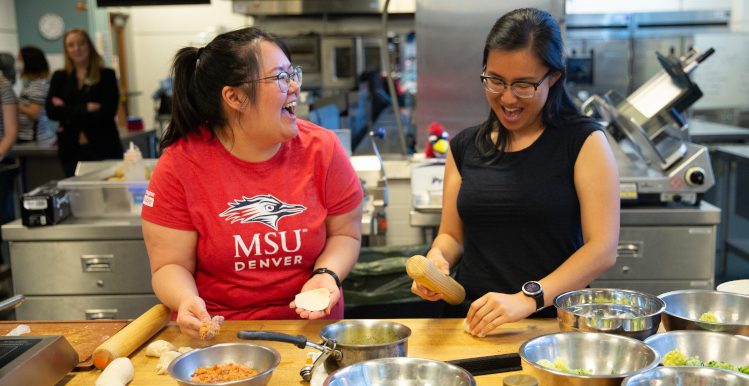Request Information
Ready to find out what MSU Denver can do for you? We’ve got you covered.
May 2, 2022
May is Asian Pacific American Heritage Month in the United States, an exciting time to not only show our appreciation for Americans of Asian descent and honor their many contributions to our country, but also take the opportunity to educate ourselves on the rich history of Asians in America.
At Metropolitan State University of Denver, we just wrapped up an exciting month celebrating Asian American culture in April, as we observe Asian Pacific Islander Desi American (APIDA) Heritage Month early so that we can engage our campus community before final exams and other end-of-semester activities take center stage.

It’s especially important to publicly and proactively celebrate Asian, Pacific Islander and Desi Americans now to combat the rise of anti-Asian bias that has occurred during the pandemic. We rallied around the Asian American community last March after the Atlanta-area shootings of six women, but that was not an isolated incident by any means: The U.S. saw a staggering uptick in violence last year, with a 339% increase in Anti-Asian hate crimes. The Stop AAPI Hate coalition tracked nearly 11,000 hate incidents against Asian American and Pacific Islander individuals between the start of the pandemic and the end of 2021.
Sadly, such hatred has existed in the U.S. since the first wave of Asians immigrated to this country in the mid-19th century. As Asian Americans were building infrastructure and working in manufacturing in the western U.S., anti-Chinese sentiment led to the first restrictive federal immigration laws, including the Chinese Exclusion Act of 1882. Colorado has its own shameful history of racism toward Asian Americans, as Denver Mayor Michael B. Hancock recently apologized on behalf of the city for an anti-Chinese riot in 1880 that included a mob lynching of a Chinese man named Look Young.
President Jimmy Carter signed the original Asian/Pacific American Heritage Week into law in 1978, which was expanded to a full month in 1990. The month of May was chosen to commemorate the first Japanese immigrants in May 1843 and the completion of the transcontinental railroad, built largely by Chinese immigrants, in May 1869.
While there are a number of phrases and acronyms to describe Asian populations, we use the term APIDA for our heritage month to recognize the diversity of ethnicities that stem from the Asian continent and island nations, including the Indian subcontinent and other Desi (South Asian) countries. Often times when people think of Asian Americans they think of East Asian cultures, but we want to be intentional about including South Asian populations too. Six Asian origin groups have populations of at least 1 million in the U.S. – Chinese, Indian, Filipino, Vietnamese, Korean and Japanese Americans – while 15% of Asian Americans trace their roots to another 15 ethnicities.
Pew Research projects that Asian Americans, currently 7% of the U.S. population, will become the largest immigrant group in the U.S. by 2055. Asian Americans make up 3.9% of Coloradans and comprise a significant portion of the Roadrunner family as well. MSU Denver educates 780 undergrads (4.9%) and 46 graduate students (3.9%) who identify as Asian. About 6% of MSU Denver staff and 8% of our faculty are Asian or of Asian descent, with more than 100 employees actively engaged in the APIDA Faculty and Staff Alliance.
The APIDA Alliance and Center for Multicultural Engagement and Inclusion collaborated on some great initiatives in April such as a film screening of “Tigertail” and discussion of Asian representation in media, a networking event with APIDA professionals from non-STEM fields, and a dumpling-making demonstration with Student Success Coach Stephanie Lee and Presidential Faculty Fellow Sophia Tran, Ph.D., that you can watch at home and follow along in your own kitchen.
I encourage APIDA faculty and staff to get involved with the APIDA Alliance, and you can get in touch through the website if interested; if you’re a student, the APIDA Alliance can also connect you to a student-led book club that is currently reading “Crying in H Mart: A Memoir” by Michelle Zauner.
Our entire community can support our APIDA neighbors by exploring the history and culture through books, movies and events. It’s so important we learn each other’s stories to help build a better future, together. I hope all members of the APIDA community feel welcome and supported at MSU Denver!
Sincerely,
Janine Davidson, Ph.D.
President, MSU Denver